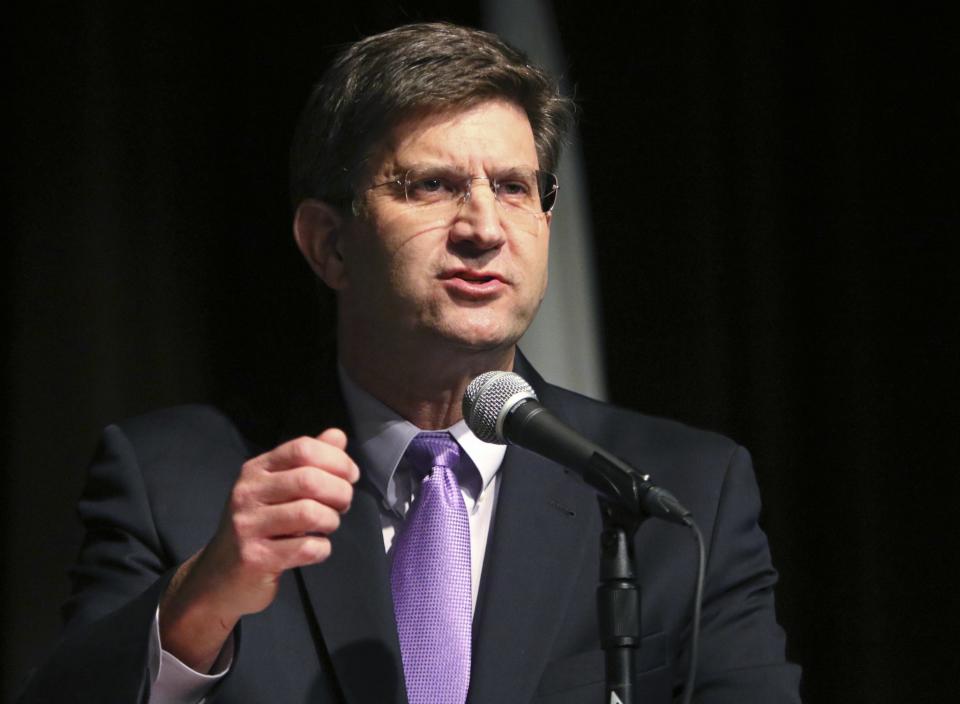Down Ticket #22: Confident of a White House win, Clinton & Co. push to expand the down-ballot map

Down Ticket is Yahoo News’ complete guide to the most fascinating House, Senate and governors’ races of 2016. Coming to you every Tuesday and Thursday until Nov. 8. What you need to know today.
_____
The debates are done and Clinton is sitting pretty. How she and her Democratic allies are trying to turn the tide in the House and Senate as well.
When the third and final presidential debate between Donald Trump and Hillary Clinton came to a close Wednesday night, hundreds of millions of Americans breathed a collective sigh of relief. At last: The most nauseating reality show in recent memory had reached the end of its all-consuming run. No more “sniffling.” No more “such a nasty woman.” No more feeling like terrified children watching Mommy and Daddy yelling at each other in public.
The end of debate season, however, marks the beginning of something else: the homestretch.
There are less than three weeks to go until Election Day. Early voting is underway. Most of October’s surprises are likely behind us. Opportunities to upend the race will be scant. And from a down-ballot perspective — which is what we specialize in here at Down Ticket — the dynamic that will define the rest of the race is becoming clear.
Democrats are on offense.
It isn’t just Trump’s unprecedented refusal Wednesday to say whether he will accept the outcome of the election — a refusal that will force down-ballot Republicans to waste yet another news cycle struggling to respond to their nominee’s ever-more-outrageous remarks.
“Peaceful transfer of power & acceptance of election results is fundamental to our democracy & Constitution,” tweeted Republican Rep. Carlos Curbelo, who is facing a tough re-election battle in Florida’s 26th Congressional District. “This cannot be undermined ever.”

The real reason down-ballot Republicans will likely spend the rest of the fall on defense is bigger than last night’s debate. With Trump continuing to implode — and with Clinton increasingly looking like an Oval Office lock — Democrats have realized that they can now afford to focus more attention, and resources, on recapturing the House and the Senate.
Earlier this week, the party’s most powerful operations — the Clinton crew in Brooklyn, the congressional campaign arms on Capitol Hill, the allied super-PACs — quietly unveiled several efforts geared toward keeping the GOP on its heels.
Let’s start with Hillary herself. On Monday, Clinton’s campaign manager, Robby Mook, announced that Brooklyn intends to channel $6 million into direct mail and digital ads to boost turnout in Florida, Iowa, Nevada, New Hampshire, Ohio and Pennsylvania — all states with competitive Senate contests and/or must-win House seats. At the same time, the campaign is also set to spend at least $2 million in Arizona — a red state that is suddenly trending toward Clinton (and has several key House and Senate races).
“Donald Trump is becoming more unhinged by the day, and that is increasing prospects for Democrats further down the ballot because of higher-than-expected turnout and enthusiasm,” Mook told reporters, citing internal campaign data that suggests more voters will show up at the polls in 2016 than in any previous presidential election.
Meanwhile, Clinton’s super-PAC, Priorities USA Action, will soon drop hundreds of thousands of dollars on ads attacking embattled Republican senators in New Hampshire (Kelly Ayotte) and Pennsylvania (Pat Toomey), exacerbating a serious GOP spending disadvantage in two critical states.

The Democratic Congressional Campaign Committee is also spending big. According to a new report in Politico, the DCCC has been funneling “millions of extra dollars to its House candidates this fall by way of a legal loophole that has helped them bypass the typical limits on coordinated spending between parties and candidates.” Apparently, House hopefuls who mention generic “Democrats” and “Republicans” in their ads — as opposed to just specific candidates — get to split the bill with the party, even if that means they’ll blow past the Federal Election Commission’s usual coordinated-spending cap of $48,100.
As a result, “more than a dozen Democratic challengers are benefiting from such ‘hybrid’ advertising,” including California’s Doug Applegate, Florida’s Stephanie Murphy, and New York’s Colleen Deacon. In one particularly extreme case, the DCCC is planning to spend more than 30 times the typical FEC limit to help former Democratic Rep. Brad Schneider run TV ads against his better-funded opponent, GOP Rep. Bob Dold of Illinois.
And though the DCCC’s latest ad buy is hardly surprising — it consists of a trio of spots slamming recent GOP Trump dumpers for not denouncing the Donald sooner — a simultaneous effort by its sister super-PAC is turning some heads. According to The Hill, “the House Majority PAC, which works to help Democrats retake the lower chamber, launched a series of ads this week targeting not only toss-up races, but also second-tier seats thought to be safely Republican just a few months ago, including those held by Reps. David Valadao (Calif.) and Lee Zeldin (N.Y.).” Like Clinton’s Arizona push, this suggests that Democrats see some new pathways to victory opening up at the eleventh hour.
Then there’s the president to consider. Just this week, Barack Obama appeared in his first down-ballot TV and radio ads of the cycle — for Senate candidates Catherine Cortez Masto in Nevada and Patrick Murphy in Florida, among others — and sent out a rare fundraising email on behalf of Toomey’s challenger, Katie McGinty. Given that Obama’s approval rating is currently hovering above 50 percent, expect more of the same in the campaign’s final sprint.

The question now is whether any of these offensive maneuvers will make the difference between winning or losing control of Congress.
It’s certainly possible. The Senate is already leaning Democratic. Assuming Clinton wins the White House, the Dems need a net gain of four seats to take control. Two weeks ago — before Trump’s “Access Hollywood” tape came out and roughly a dozen alleged victims of his inappropriate sexual advances came forward — the party stood a 50-50 chance of pulling it off, according to the New York Times’ Upshot forecasting model. Now the same model gives them a 61 percent chance.
This is largely a result of polling shifts in the state that hosted Wednesday’s debate: Nevada. In the wake of the “Access Hollywood” flap earlier this month, Nevada’s Republican Senate candidate, Rep. Joe Heck, disavowed Trump, whom he had steadfastly supported. Conservatives booed, accusing Heck of cowardice; Democrats pounced, painting him as an opportunist. Heck had led in every survey since the start of September — but now the four polls taken since Oct. 8 show Cortez Masto ahead, on average.
It’s too soon to say for sure, but Wednesday’s “I’ll keep you in suspense” moment could create similar problems for other GOP Senate candidates nationwide. At the very least, it will give Clinton & Co. more grist for all those down-ballot attack ads. Even before the debate, Democrats were planning to step up “their efforts to yoke down-ballot Republicans to Donald Trump [by] savaging an ever-increasing number of GOP candidates as pawns of their party’s embattled presidential nominee.”
The House is trickier to game out. For one thing, Democrats don’t need to flip just four seats to win control; they need to flip 30. That’s a Herculean task for several reasons. According to our expert partners at the Cook Political Report, there are only 37 competitive races — total — including six for seats currently held by Democrats. “Today, even if they won all 6 seats in Lean Democratic and all 18 seats in Toss Up, they would still need to win 11 of 13 races in Lean Republican to win the majority,” writes Cook analyst David Wasserman.
Political science has also shown that the more of a lock one party’s presidential nominee becomes, the more voters tend to gravitate toward the other party’s down-ballot candidates in the name of “balance.” Redistricting gives Republicans a built-in advantage. Tying GOP candidates to Trump doesn’t seem to be working particularly well in blue-collar districts. And so far, Democrats aren’t leading by a big enough margin on the generic congressional ballot question — the one that asks voters which party they want to preside over Capitol Hill next year — to propel 30 or more of their House pickup candidates to victory.

So why even bother speculating about it? Because the more Trump falters — and the more he hints that he may not honor the electoral will of the American people — the more he risks depressing GOP turnout on Nov. 8.
And if that happens, all bets are off.
“In this volatile environment, the current fundraising gap [with Democrats] is unsustainable, and will negatively affect Republican electoral prospects if not addressed,” the National Republican Congressional Committee said in a memo that leaked on Wednesday. “We could run the risk of facing substantial losses on November 8.” The picture on the Senate side looks the same, with Democrats ready to outspend Republicans in Pennsylvania, New Hampshire, North Carolina, Indiana, Nevada and Missouri in the coming weeks, according to an internal GOP document obtained by Politico.
Democrats aren’t banking on a wave election. But they want to be ready if an anti-Trump swell starts to take shape. On Tuesday, the DCCC revealed that it had raised a record-breaking $21 million in September, nearly double its haul for the previous two months combined. The logic behind this spending spree is simple. At worst, Democrats will expand the map, forcing Republicans to play defense. At best, they’ll end up with a Democratic president and a Democratic Congress.
_____
Let the ‘check and balance’ games begin
For months now, down-ballot Republicans have been hinting that, if things get really bad for Donald Trump, they might pull a 1996.

That year, GOP House and Senate candidates ditched Bob Dole, conceded that President Bill Clinton was going to win re-election, and pitched themselves to voters as a check on Clinton’s “liberal agenda.” The strategy wound up working: Republicans retained control of the House and picked up two seats in the Senate that November.
Republicans have yet to deploy the “check and balance” argument in any sort of widespread or coordinated manner. But that could change after Wednesday’s disastrous debate.
“The biggest loser tonight was not Trump,” said Robert Blizzard, a GOP pollster who is working on a number of congressional races. “The presidential race is over. Instead, down-ticket Republicans lost tonight — they needed some help and got absolutely none.”
As a result, be on the lookout for more “check and balance” talk from the GOP in the final weeks of the campaign.
Democrats certainly are. In fact, they already seem to be ready with a response.
“So what does ‘checks and balances’ mean?” House Minority Leader Nancy Pelosi told reporters Wednesday. “It’s a euphemism for obstruction.”
“Voters will see right through this ruse for the obstruction that it is,” added DCCC Chairman Ben Ray Lujan on a private caucus call with House Democrats.
_____
Ron Johnson does the dirty work
Wisconsin polls show incumbent GOP Sen. Ron Johnson trailing the man he unseated six years ago, Democrat Russ Feingold, by an average of 5.3 percentage points. One recent survey puts Feingold ahead by 12.
Desperate times, it seems, call for desperate measures — hence Johnson’s latest ad.
Alluringly titled “Diapers,” the spot features Johnson’s very blond family sitting around the kitchen island, as families do, discussing how they “didn’t want [him] to run for a second term” because “politics have been pretty disgusting lately.”
Meanwhile, Johnson is off in the bedroom changing his grandson’s diaper.
“I’ve got this covered,” Johnson says.
Then the baby urinates on him.
Enjoy:
_____
The best of the rest
She's opposing Trump, but Ayotte not asking NH voters to do the same. "My decision was my vote on this issue" https://t.co/xsrDpRAjtT
— Burgess Everett (@burgessev) October 18, 2016
It’s a Trump-free zone as Ryan stumps for fellow Republicans https://t.co/0r3uTDeJtb via @bpolitics
— Billy House (@HouseInSession) October 19, 2016
NEW POLL: Trump backer Sheriff Joe Arpaio trails Dem opponent by 15 points https://t.co/6COeJKF7Q8 pic.twitter.com/zDqiCYgZ4v
— The Hill (@thehill) October 20, 2016
Marco Rubio warns GOP against discussing WikiLeaks: 'Tomorrow it could be us.' https://t.co/VWHfHg2bR2 ????
— Capital Journal (@WSJPolitics) October 19, 2016
GOP senators slam Trump for refusing to say he'll accept election results https://t.co/cNc5ExvO9w #debate pic.twitter.com/Vi6uTm9skZ
— The Hill (@thehill) October 20, 2016
_____
Countdown
_____




